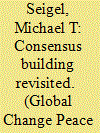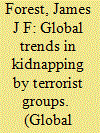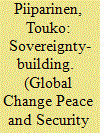| Srl | Item |
| 1 |
ID:
116133


|
|
|
|
|
| Publication |
2012.
|
| Summary/Abstract |
This paper is a summation of material drawn from 18 papers written by Professor Toshio Kuwako of the Tokyo Institute of Technology. The purpose of the paper is to present an overview of Kuwako's approach to consensus building and make it available to the English-speaking world. The papers written by Professor Kuwako are largely experiential accounts with reflection on and analysis of that experience. The organization given to the present paper is that of the present writer. Given that doubts are sometimes raised about consensus building in regard to intractable issues where no agreement seems possible, and that it is precisely these kinds of issues that are the focus of Kuwako's work, his contribution would seem important.
|
|
|
|
|
|
|
|
|
|
|
|
|
|
|
|
| 2 |
ID:
116132


|
|
|
|
|
| Publication |
2012.
|
| Summary/Abstract |
This study examines 40 years of kidnapping incidents by terrorist groups and finds several interesting trends, including terrorist groups are engaged in more kidnapping than in years past, but the proportion of kidnapping among all terrorist events annually has remained fairly constant; the geographic concentration of kidnapping incidents has shifted from Latin America (1970s-1990s) to South Asia (2000s-present); left-wing Marxist revolutionary groups have kidnapped more than groups in other ideological categories, but there has been a significant increase over the past decade in kidnappings by Muslim extremist groups; terrorist groups overall appear far less interested in kidnapping for financial gain than for political or policy concessions; and terrorist groups are selective about the type of people they target for kidnapping, which is striking given that many other kinds of terrorist attacks (e.g. bombings) are indiscriminate with regard to victims. The article concludes with some implications and recommendations for future research.
|
|
|
|
|
|
|
|
|
|
|
|
|
|
|
|
| 3 |
ID:
116135


|
|
|
|
|
| Publication |
2012.
|
| Summary/Abstract |
This article aims to examine Brazil's foreign policy on nuclear issues from 1940 to 2011 and identify the main factors that defined the ways through which Brazil searched for autonomy in issues related to nuclear non-proliferation, nuclear disarmament and peaceful uses of nuclear energy. It argues that changes in the ways through which Brazil searched for autonomy were results of external pressures from great power states and opportunities to engage with nuclear-weapon and non-nuclear-weapon states created by international institutions, as well as pressures from domestic actors such as congressmen, military men, nuclear researchers and civil society groups.
|
|
|
|
|
|
|
|
|
|
|
|
|
|
|
|
| 4 |
ID:
116134


|
|
|
|
|
| Publication |
2012.
|
| Summary/Abstract |
This article discusses the evolving framework of a new branch of international public law - international Internet law (IIL), the public international law framework for Internet governance. The article presents the genesis of IIL, its principles and perspectives; tackles key challenges to this new interdisciplinary area of research, such as cyber-security, jurisdiction and privacy protection; and draws analogies between IIL and such traditional areas of international public law as environmental law, human rights law and law of the sea. The article presents current proposals of applying international environmental law due diligence standard to state responsibility for cyber-attacks and giving critical Internet resources the Common Heritage of Mankind status. The role of soft law in creating IIL is emphasized and successful examples of its exercise are presented. The article then goes on to elaborate on hard-law proposals for IIL (Internet Framework Convention including a unique multistakeholder model of participation and responsibility) and presents them as the further evolutionary path for IIL.
|
|
|
|
|
|
|
|
|
|
|
|
|
|
|
|
| 5 |
ID:
116137


|
|
|
|
|
| Publication |
2012.
|
| Summary/Abstract |
This article argues that the increasingly frequent and robust implementation of the Responsibility to Protect (RtoP) principle reflects not only the operation of the functionally narrow doctrine of humanitarian intervention, but also the emergence of a new paradigm of global security, namely sovereignty-building. RtoP protects populations from mass atrocity crimes, supports and builds responsible sovereigns committed to protecting their populations, and restrains 'irresponsible' sovereigns. These functions of RtoP perfectly capture the sovereignty-building paradigm. This article will draw upon the philosophical literature on sovereignty, the analysis of the norm development of RtoP, and empirical evidence of the UN Security Council's deliberations on the situation in Libya in 2011 to argue that the image of responsible sovereignty featured in RtoP is composed of three aspects: popular, spontaneous and indivisible sovereignty. That image is projected on states in the implementation of RtoP, and constitutes the teleological objective of the emerging paradigm of sovereignty-building, which can be distinguished from the traditional doctrines of state-building and humanitarian intervention.
|
|
|
|
|
|
|
|
|
|
|
|
|
|
|
|
| 6 |
ID:
116136


|
|
|
|
|
| Publication |
2012.
|
| Summary/Abstract |
The idea of human security continues to gain global recognition, offering an alternative framework for the evolving challenges of the new century. While the human security literature has addressed the definition of the concept exhaustively, thorough analyses on efforts to operationalize it are scarce. The UN Trust Fund for Human Security is an appealing source of insights on the praxis of the idea because of the Fund's long-standing effort, which includes more than 190 implemented projects. The article is an examination of the Fund's experience operationalizing human security in three steps: principles, criteria, and actual project formulation. While asking what a human security project is, the article follows the process through which the results of the Commission on Human Security are translated into the Fund's guidelines, and how those guidelines are used to design activities. The revision highlights the strengths of a human security framework when addressing complex situations, allowing for multiple, innovative interventions under one umbrella of action. However, coordination problems and an evaluation of whether humans are more secure through the use of the concept remain operational concerns.
|
|
|
|
|
|
|
|
|
|
|
|
|
|
|
|